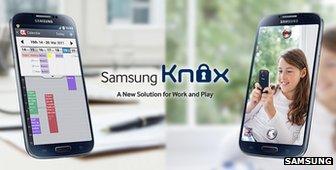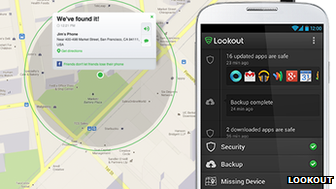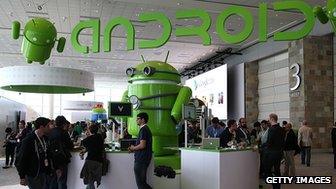Samsung beefs up Knox malware protection with Lookout
- Published

Samsung's Knox security product helped the firm's handsets be approved for use by Pentagon workers
Samsung has signed a deal with an anti-virus firm to offer improved protection to its Galaxy-branded Android devices.
It will use San Francisco-based Lookout's software to scan handsets and tablets for threats.
The feature will be targeted at business users as part of the firm's forthcoming Knox security product, which was announced in February.
Numerous studies have indicated that many hackers have focused their efforts on Google's Android system.
Analysts said the move was designed to reassure companies that Samsung's Android phones were a safe alternative to the Blackberry, external and Windows Phone platforms, external which have promoted their enterprise security facilities as key features.
More malware
Lookout's chief executive blogged that malware protection had become increasingly important at a time more employees were linking their own devices to office networks.
"One in three companies now allow employees to bring their own devices to work, and whether or not it's allowed, employees are doing so and company data is being accessed outside of the corporate network, potentially putting that data at risk," wrote John Hering, external.
The company said its servers would scan Samsung's mobile devices against known malware that could be introduced via email attachments, webpages or file-sharing services.
Other anti-virus firms have also been quick to play up the threat to Android devices.

Lookout says its software will protect Galaxy device owners against known types of malware
Kaspersky recently announced that it had detected 57,000 new examples of malware specifically targeting the operating system since the start of the year.
McAfee has also warned that new types of spyware, external and code designed to bypass bank ID protection had helped swell the amount of Android malware by 35% in the April-to-June quarter.
The US government has also issued its own alert, external suggesting 79% of all malware threats to mobile operating systems were directed at Android in 2012.
"Android is the most insecure mobile system of all the mobile ones, and that's been made more difficult because it's so fragmented," said Richard Absalom, an analyst at telecoms consultancy Ovum.
"It's not just that that people are still running old versions of the software, but that Samsung and other vendors are forking the OS in different ways."
Google itself has taken steps to address the problem. Earlier this month it banned apps, external from its Play store that make changes to a device without the owner's knowledge or consent.
But one expert suggested the firm had still not gone far enough.
"New variants of Android malware are found every day, with most designed to steal money from users by signing them up for expensive premium rate SMS scams," independent security analyst Graham Cluley told the BBC.
"Much of the Android malware has disguised itself as fake versions of popular apps like Angry Birds or Instagram, and although its normally encountered in unofficial app stores they have also managed to intrude into Google's official Play store on a worrying number of occasions."
Defence-approved
Samsung began offering its Knox product to selected Galaxy S4 handsets in May and has promised it would be extended to other devices.

Google has taken its own steps to tackle the prevalence of Android malware
The Pentagon is among organisations to have authorised the use of handsets which include the feature.
"This approval enables other government agencies and regulated industries such as healthcare and financial services to adopt Samsung Galaxy smartphones and tablets," the South Korean firm said at the time.
Ovum suggested the latest announcement would help give the company an edge over other Android manufacturers such as Sony, HTC and LG.
"What Samsung is doing here is seeing a gap in the market," said Mr Absalom.
"Blackberry's share within enterprise is dropping and Windows Phone isn't picking up as fast as Microsoft might have hoped.
"Samsung is the biggest individual smartphone manufacturer out there and it thinks it can now make a major play in the corporate market."
- Published28 August 2013
- Published24 July 2013